Wading through the watering of chickens!
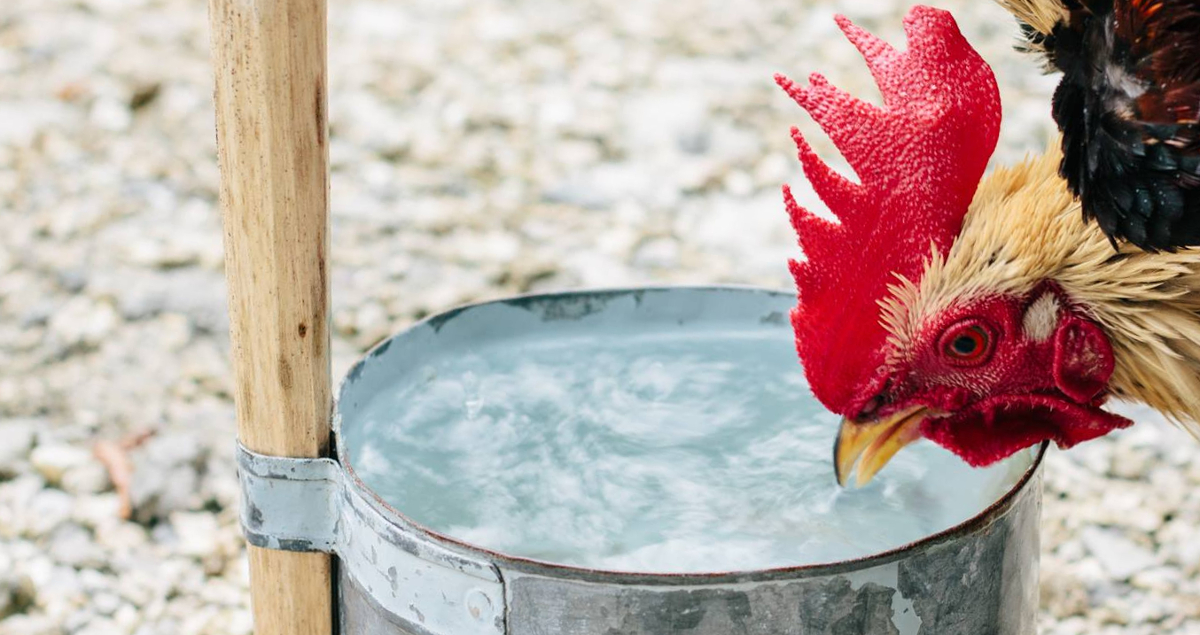
Water is one of the main things chickens, and every other living thing, needs constant access to. Beyond just water, they need access to clean, liquid water if you’re keeping chickens during the winter where it freezes.
It can be terribly frustrating for backyard chicken keepers to see their chickens drinking out of a muddy puddle after it has rained. You can rest easy, chickens are tolerant of dirty water to some extent but should be given clean fresh water everyday.
Table of Contents
- How to water chickens:
- How often to change your chickens water:
- Ways to water your chickens:
- How do you keep you chicken water clean?
- Why do chickens dirty their water so easily?
- How do I keep my chickens water clean?
- How do I keep algae from growing in my chickens water?
- How to clean chicken waterer:
- How to sanitise a chicken waterer:
- Do I give my chickens normal tap water?
- Will chickens drink dirty water?
- Can you give chickens rain water?
- How often do I need to refill my chicken’s water?
- What sort of chicken water container do I recommend:
How to water chickens:
Chickens need a supply of water that wild birds and vermin can not get into. Legally you need to provide at least 2.5 cm drinking space per chicken or circular drinking troughs providing 1 cm per hen.
Experiments have shown that chickens consume between 125 and 500 ml of water every day. The amount varies depending on the temperature of the environment and the sex, age and size of the chicken.
In the early stages, a dehydrated chicken will begin to pant heavily with a wide open beak and hold the wings away from the body. Within a few hours they will develop pale comb and wattles and stop laying.
I use galvanised metal water containers for my chickens and I rinse and refill them every morning. Changing the water everyday helps get you among your chickens and you can give them a good look over for any other problems.
Tips for successful watering of chickens:
- Hens need more water than cockerels as they produce eggs.
- Always have at least two sources of water.
- Change the water everyday.
- Raise the water containers up 8 to 12 inches to keep them clean.
- Avoid plastic buckets.
- Avoid open containers with large surface areas.
- Add ice on hot days to keep the water cool and fresh.
A chicken can survive as long as 48 hours without water but will begin to suffer after 6 hours or less if the weather is hot.
How often to change your chickens water:
Chickens need a continuous supply of fresh water.
Changing the chickens water everyday gets you out into the flock and can help in giving you a heads up if anything else is wrong.
I'm not a fan of watering systems that last 7 or 10 days without needing to be refilled. I do it every morning.
Chickens love their fresh water, and drink more than you’d think - especially if the weather is warm. You have to replace your chickens’ water once or twice a day, so you can be sure the water they have is guaranteed to be fresh.
Ways to water your chickens:
There is a variety of ways to provide your chickens with water:
- Buckets filled with water.
- Nipple drinking systems.
- Float and cup systems.
- Cage mounted systems or cups.
How do you keep you chicken water clean?
You can keep your chicken water clean by raising the waterer up and placing it on two bricks so as it is above the level they are scratching at or reduce the size of the opening by using a cup system. There are some very clever chicken waterers that lift the drinker up 8 inches or so to help keep the water clean.
Having clean water for your chickens is essential to their health, just like it is to ours. Without it, you might have some very sick chicks on your hands!
Chickens, however, don’t respect keeping the water clean. They will happily poop into it, use it as a wash room and kick dirt or bedding into it. When I first got my chickens, we got a basic plastic waterer and I was changing the water twice a day to try to keep it clean for them.
Below: The standard plain bucket of water for your chickens. Okay in theory but easy to tip over and difficult to clean.
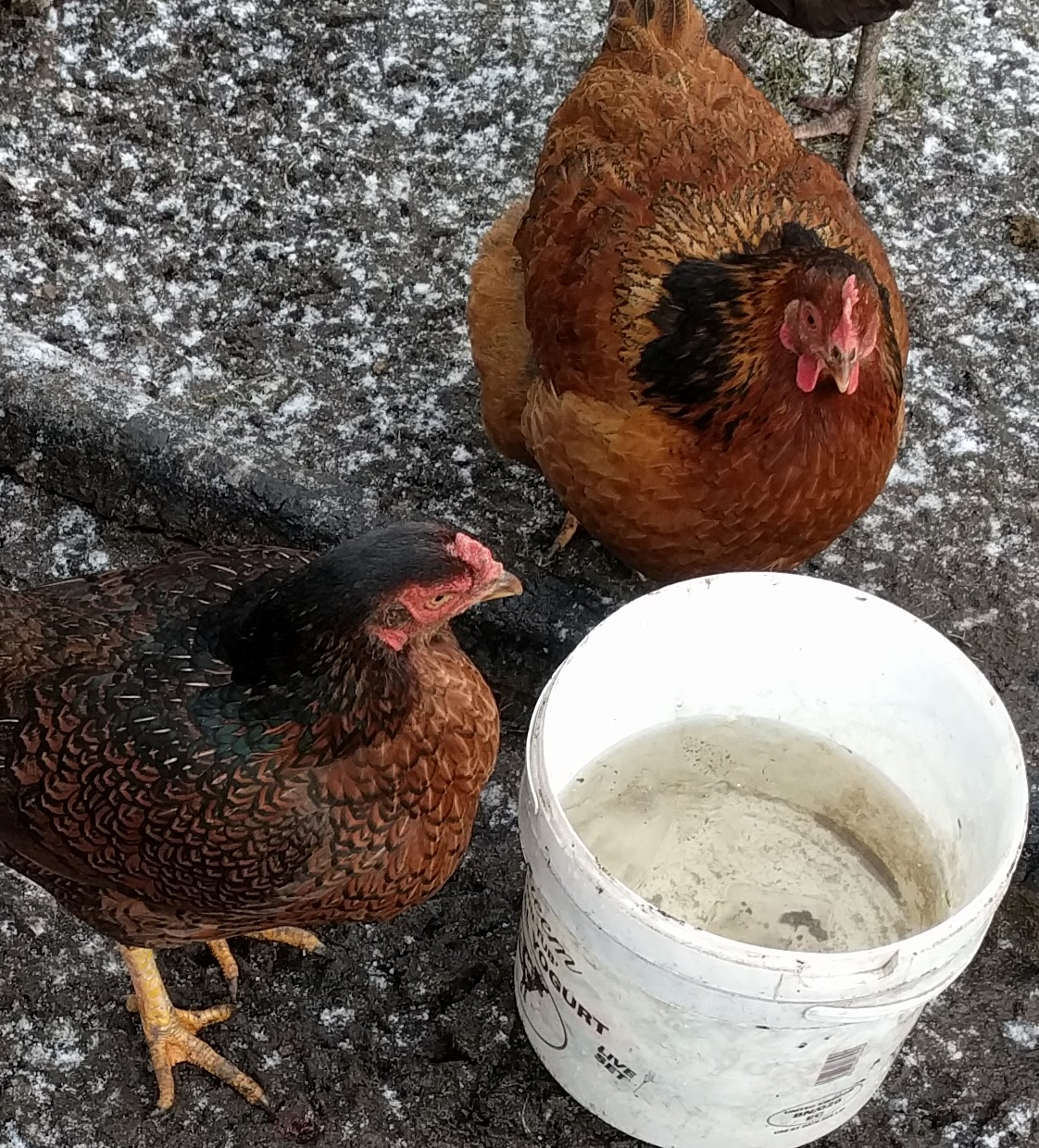
Chickens will dirty any water over time as bits wash off their beaks when they drink leading to a gradual build-up of sediment in the water. Or they stand in it with muddy feet.
Over the years since then I have tried a great many ways of watering my hens from buying various types of chicken waterers, building my own and experimenting on my chickens to see how it all works.
Below: The small cup and float chicken drinker. Still needs to be raised up a few inches.
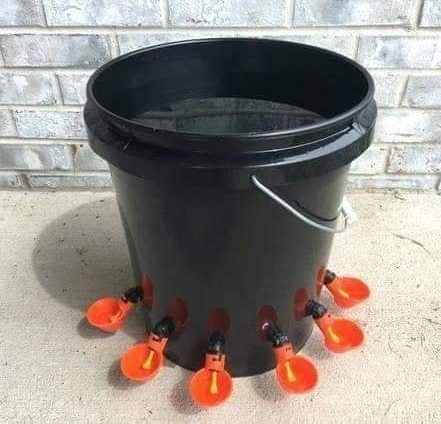
I tried getting a waterer that was a metal ball affair, like what you’d use for a hamster water bottle, which screwed onto a pop bottle. You could hang this on the side of the run and they could get water from it without the reservoir getting dirty.
Our chickens didn’t really like this system and never really got used to the nipple system I put together for them either. They kept drinking from the original waterer whenever it was available even seeming to prefer the puddles to drinking from a nipple.
I like to keep 2 sources of water for my birds especially in the heat of summer.
Why do chickens dirty their water so easily?
Chickens aren’t the most careful of creatures when it comes to keeping their water clean. They can often flick bedding, shavings, debris, dust and dirt into previously fresh liquid, and sometimes they might accidentally mistake it for the bathroom!
Below: Chicks and young birds are really bad at making a mess in the feed and water. These are the basic plastic drinking fountains for chicks.
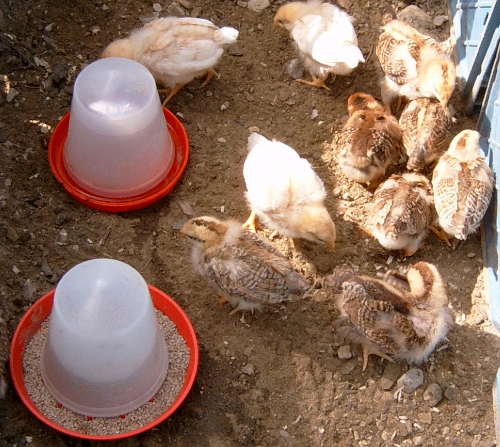
The problem here is that chickens head end doesn't know what the tail end is doing, they are almost completely instinctive creatures.
Much to the frustration of the flock keeper they scratch and poop without wondering where it will end up. They also have a habit of scratching wood shavings up into a pile and that pile could be in the waterer.
How do I keep my chickens water clean?
There are two main solutions to keeping a chickens water clean:
1. The first solution is to use the fact that chickens’ heads are higher than their cloaca (where the waste comes out). If you get the waterer higher, they would be able to drink but not use it as a toilet and there would be much less chance of it getting wood shavings or bedding in it.
I have discovered that the ideal height for bantams is around 5 to 6 inches above the ground and for large fowl hens 8 to 9 inches is the best. If you go too high they will try to fly up to it and possible tip it over.
Below: Cage mounted or hanging drinkers are easy to use come in a range of sizes.
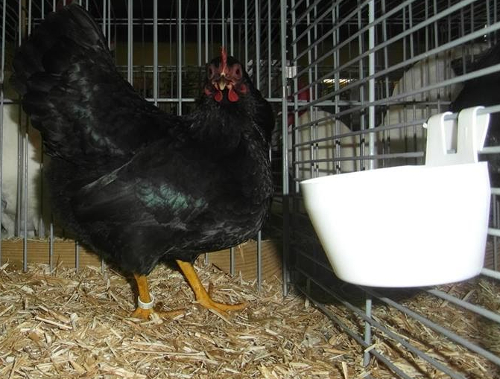
One of the best solutions for raising the chicken water up a few inches is a pallet. Cut it down so as the water dish fits in the middle and there is a few inches all around for the birds to stand.
2. The second is to use a method of delivering the water so that the chicken can only get it's head in to drink. This is the chicken fountain drinking systems you see advertised or you can build your own, they are not difficult to make at all. The alternative id to use a plastic container like a tote and cur small chicken head sized holes around it and fill it with water. This allows the chickens to stick their heads in to drink but the holes are both raised and small and should keep the majority of the rubbish out of the water.
Keep wood shavings out of chicken water: Raise up the waterer so its at natural chicken head height.
Below: Raised up cage mounted poultry drinker.
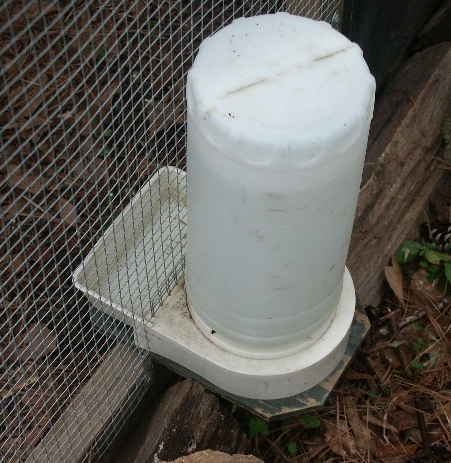
Keep chickens from pooping in water: Use small bucket style waterers or those with small holes in the chickens can only put their heads inside.
Below: This type of drinker will keep water cleaner for longer.
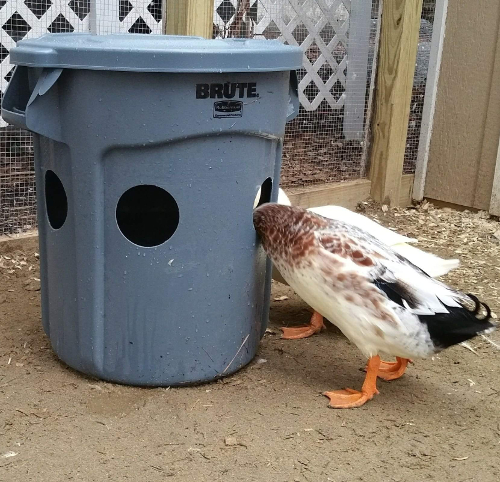
How do I keep algae from growing in my chickens water?
Algae is a chlorophyll-containing aquatic organism you find in water that been standing for 3 to 5 days or so. It starts as a thin layer of green slime and can grow quite large if left. To grow it requires water, warmth and sunlight so the easiest way to keep the green out you your chickens water is to deprive it of warmth or sunlight.
I am going to add something here that is possible going to be unpopular: If you are having a problem with green algae in the water then you are not cleaning your equipment and giving fresh water often enough!
You can prevent your chicken water from turning green by adding a few drops of ACV or Apple cider Vinegar to each litre of water. This raises the acidity and slows the growth of the algae but you can't do it all the time, it's not good for the hens. ACV should never be more than 1% of the water.
Using galvanised metal containers is easier as they need cleaning much less often and exclude the light so the algae won't grow at all.
How to clean and sanitise chicken waterers:
The best way to clean your chicken keeping equipment is thoroughly with a brush, hot soapy water and rinse with boiling water. Failing that, put it through your dishwasher. This should be done at least every week.
You can bleach it but you must make sure you rinse it off properly afterwards. If you don't get all the algae off by scrubbing it will grow back even faster in the future.
Probably the easiest way is boiling water or your dishwasher.
Baby sanitiser works as well.
I am personally against the use of chemical sterilisers with my birds and avoid them if I can.
Do I give my chickens normal tap water?
The rule is if you would drink it then it’s safe for your chickens as well.
A problem can be in some countries tap water often contains a number of different additives such as fluoride and chlorine. The reality is that these are generally included in such small amounts that it will have no effect on your chickens and if you are worried about it then let the water stand for 24 hours for dissolved gases to leave the water before using it.
If you are giving your chickens water with fluoride in it, it’s best to up their calcium intake with some shell and grit mix as in some cases it can affect egg shells and bone density.
Will chickens drink dirty water?
We have all had a chicken that has walked straight past the clean fresh water you have just put down and started drinking from a muddy puddle, I know I have.
That puddle of rain water is probably not as dirty and contaminated than it may first appear and as chickens spend a lot of their time scratching around in the dirt it probably doesn't contain anything they haven't already been exposed too.
Chickens, like most animals have a better tolerance to dirty or contaminated water than humans do. My dog for example often drinks from rivers, ponds and puddles and never gets ill from it.
We give chickens, pets and animals in our care clean and fresh water all the time because it takes away a possible source of infection for pathogens, coccidiosis and parasites. So it saves us the keeper time and money in the long run.
But yes, chickens will drink dirty water and you can't really stop them unless you keep them confined or you live somewhere where it never rains.
Can you give chickens rain water?
Yes, as long as it is stored in the dark and clean, rain water is just fine for chickens.
My fields have no piped water supply so I have to make use of stored rain water. I use 44 gallon dark blue or green plastic drums with covers on the lids so nothing can contaminate the water supply.
How often do I need to refill my chicken’s water?
You should be giving your chickens fresh water every day.
Unless you have a lot of chickens then the best way is by hand. Simply tip out the old water and add fresh.
Below: Winter is a difficult time.
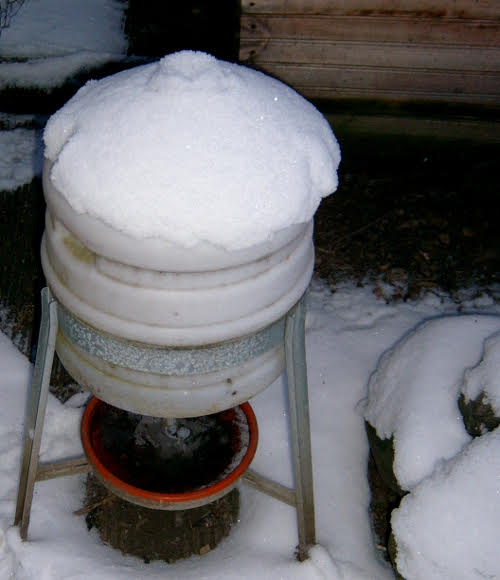
Many chicken owners use nipples as part of their watering system. They’re little piece of plastic that you screw into a hole you’ve drilled in a plastic container – many people use buckets or PVC pipes for this.
The nipple has a piece of metal running through it, that lets water drip out when it’s pushed. Chickens will quickly learn to peck at it for water, and this will give you a very clean, contained watering system. The trouble is in cold weather they freeze almost instantly.
One option for winterising a chicken coop is to build a PVC pipe watering system with insulation around the pipe – to prevent freezing.
See how long can chickens go without water.
What sort of chicken water container do I recommend:
I have tried most things over the decades for keeping chickens well watered. From the original plastic bucket to stainless steel trays and now i always settle on galvanised drinkers.
Below: My recommendation for a water supply for chickens. It comes in different sizes and is easy to clean and everlasting.
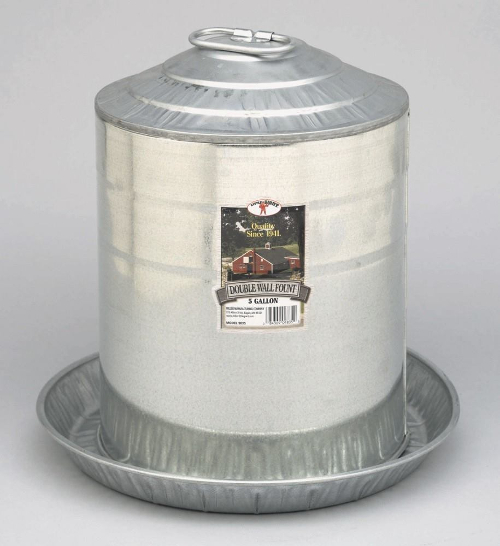
To encourage your chickens to drink in hot weather fill a dish with ice water
